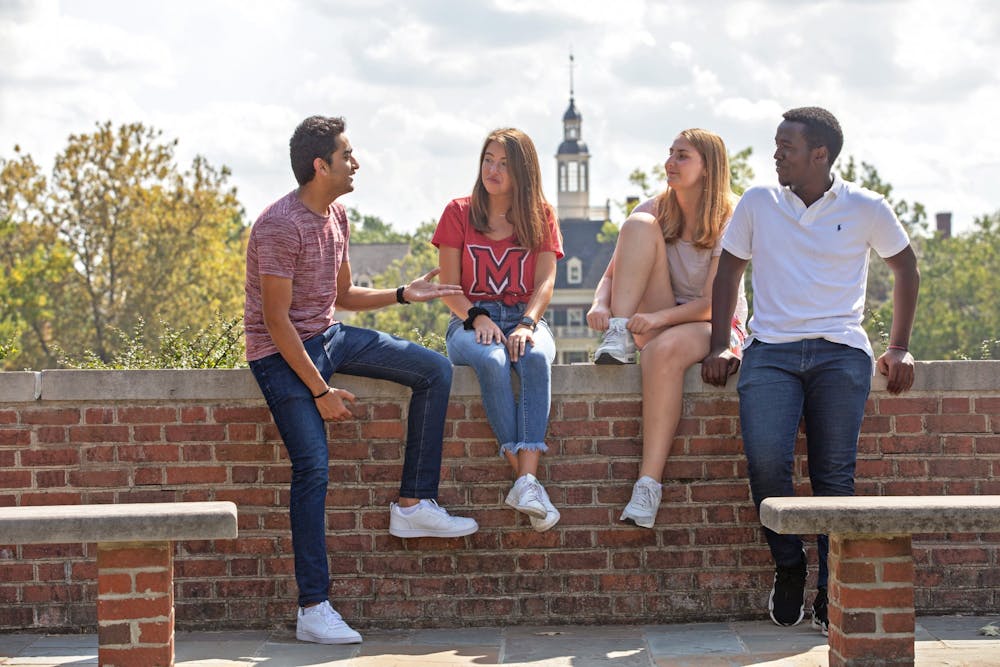When she learned that Miami University had suspended face-to-face classes for the rest of the semester, junior Zhuoran Bao started looking for flights back to her home in northern China.
It took her awhile to find one, and the one she ended up booking has a layover somewhere in Africa.
“Booking a flight was the hardest part because many airlines canceled all their flights to China,” said Bao, a media and culture and emerging technologies in business + design major. “I had no choice.”
Following Miami University’s decision to move all classes online for the rest of the semester and force students to move off campus by March 21 due to the spread of novel coronavirus, many students are left uncertain of how to proceed.
One group that is especially uncertain is international students.
President Donald Trump’s ban on travel to Europe took effect at 12 a.m. on March 14, so European students who wished to return home had to quickly do so before this time.
Senior finance major Anatole Taillard, an exchange student from France, said he decided to return home even before Miami suspended all face-to-face classes. However, Taillard said Miami offered very few answers about his precarious situation.
“I think it was a good decision to go home very quickly, but when I asked [Miami] whether I had the authorization to return to France, they were unable to answer me other than by saying ‘We assure you will get your credit hours,’” Taillard said. “I ended up booking tickets without waiting for an answer and decided to deal with this problem in France.”
Like other Miami students, Taillard will continue taking his classes remotely. But, this may prove especially difficult for him since France is five hours ahead of Ohio.
“[Online classes] will be very difficult, especially since I’ve never taken one before,” Taillard said. “In addition, it will be difficult for me to do certain exams that will take place between 7 p.m. and midnight or to carry out my group projects.”
Additionally, some countries, such as China, place restrictions on their citizens’ internet access, which could also complicate online learning for certain students. But, Bao said, China is relaxing some of these restrictions in light of the situation.
For students returning home, a major concern is whether taking classes remotely will violate their visas. But, the U.S. government has taken steps to ensure this doesn’t happen.
Enjoy what you're reading?
Signup for our newsletter
Molly Heidemann, director of International Student and Scholar Services (ISSS), said that international students are not in danger of violating their visas due to new guidelines put out by the U.S. Department of Homeland Security on March 9. According to these guidelines, schools that are transitioning to online classes, like Miami, must report their plans for doing so to the U.S. Immigration and Customs Enforcement’s Student and Exchange Visitor Program (SEVP).
“SEVP is focused on ensuring that nonimmigrant students are able to continue to make normal progress in a full course of study as required by federal regulations,” a message sent to students using SEVP’s services reads. “SEVP intends to be flexible with temporary adaptations.”
These allowances are being made so that students on F visas — for those pursuing bachelor’s, master’s or graduate/professional degrees — and M visas — for those in vocational or technical programs — can maintain their full-time student statuses even while taking classes remotely, which was not previously allowed. Most of Miami’s international students are on F-1 visas, Heidemann said.
Though international students can return home without violating their visas, some may prefer or need to remain on-campus. These students can apply for a move-out exemption. Additionally, international students living off-campus are free to remain in Oxford if they so choose.
Alvaro Acero García, a senior computer science major from Spain, said that he’s decided to remain in Oxford for two reasons: because he has a lease on his off-campus apartment until July and because the coronavirus outbreak is worse back home than it is in the U.S.
“I could go home if I wanted to, but if I have to pay rent until July, I might as well just stay,” Acero García said.
Though many students have successfully returned to their home countries, the issue of returning home in the fall is still up in the air.
Bao said ISSS told her she’d have to obtain a new visa for the next academic year if she remained home for more than five months, but all the places in China where students can renew their F-1 visas are closed for the foreseeable future.
Because of this, she may have to return to Oxford a month early to avoid letting her visa expire, but it may be difficult for her to find somewhere to stay.
“I still have no idea [what will happen] because things are changing every day,” Bao said. “I also don’t know if the situation will be better in July because the virus is terrible everywhere, but I hope that things get better and I can come back.”
Despite the complications this situation has presented for international students, Taillard, Acero García and Bao all said that they thought Miami — and the United States as a whole — was making a good decision by suspending face-to-face classes.
“It’s particularly important for the U.S. to contain the virus because the American [healthcare] system is expensive,” Taillard said. “If the virus spreads, many people will not be able to pay for care, and the consequences could be dramatic.”
Additional reporting by news editor Julia Arwine.
Miami’s coronavirus information page can be accessed here. The CDC also has a comprehensive coronavirus page. Anyone who is experiencing symptoms can call the Student Health Service at 513-529-3000.
Students with questions about the coronavirus and the university’s policies can reach out to Associated Student Government.




